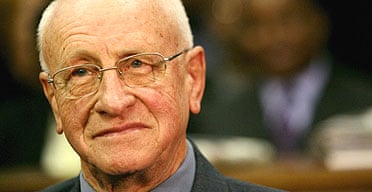South Africa's former law and order minister, Adriaan Vlok, today became the only senior politician in the country's white regime to be convicted of apartheid-era crimes when he pleaded guilty to the attempted murder of a prominent cleric.
Mr Vlok received a 10-year suspended prison sentence under a plea bargain by admitting he ordered the security police to kill the Reverend Frank Chikane, a leading anti-apartheid activist, in 1989.
The deal saved former cabinet colleagues the prospect of a full trial and further revelations about just how much South Africa's white rulers knew of atrocities, including murders, bombings and torture, that they continue to blame on rogue elements in the security forces.
The former police commissioner, Johan van der Merwe, and three other former high-ranking policemen also pleaded guilty and received suspended prison sentences of between five and 10 years.
Rev Chikane, now the director of President Thabo Mbeki's office, sat behind the five elderly, grey haired accused who laced his underwear with a nerve agent that nearly killed him when he was secretary general of the South African Council of Churches.
The cleric said he forgave the men for trying to murder him. Mr Vlok, a born-again Christian, is the only former cabinet minister who has admitted to apartheid-era crimes. It was his extraordinary plea for forgiveness to Rev Chikane, as he washed the cleric's feet, that led to the prosecution.
The state prosecutor, Anton Ackerman, told the court that the charges against Mr Vlok did not constitute a "Nuremberg trial" nor an attempt at revenge.
But protestors outside the court demanded more trials for those who failed to gain an amnesty in return for admitting their crimes to the Truth and Reconciliation Commission (TRC).
One placard carried a picture of the last white president, FW de Klerk, who won a Nobel peace prize for ending apartheid but whose claims to know nothing about murders and other crimes has been met with scepticism.
The placard said: "Walked out of the TRC, selective memory denialist, noble peace laureate?"
The TRC granted amnesty to nearly 1,000 people but Mr Vlok was the only former cabinet minister to apply for ordering bombings on anti-apartheid groups and other attacks. The former president, PW Botha, refused to testify.
The 33,000 strong Khulumani Support Group, which runs programmes for the victims of apartheid abuses, was outside the court in support of its demand for a "a charter of redress".
"The charter identifies the fact that reconciliation has a price - the price is the cost of redressing the terrible wrongs done to individuals and communities across South Africa," the group said.
Others were on hand to demand that ANC leaders also be put on trial for crimes committed in their struggle against apartheid.
A group allied with mostly white trades unions, AfriForum, marked the trial with a flower-laying ceremony in memory of "victims of ANC terror attacks" and "other victims of gross human rights violations".
Its chairman, Kallie Kriel, said the TRC found that ANC leaders could be held responsible for the "gross violation of human rights" during landmine attacks as well as "other acts of terror".
"If the National Prosecuting Authority persists in treating the ANC's leaders differently from other offenders, any future prosecutions will amount to selective morality and a witch-hunt," he said.
"We are undoing the legacy of Mandela by taking this step ... what we have now can be seen as retaliation, not reconciliation."
